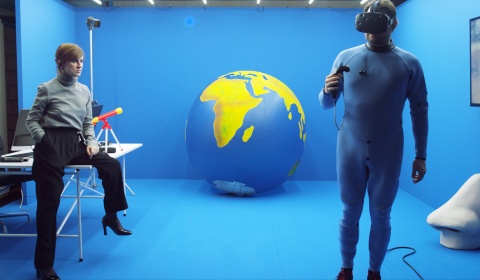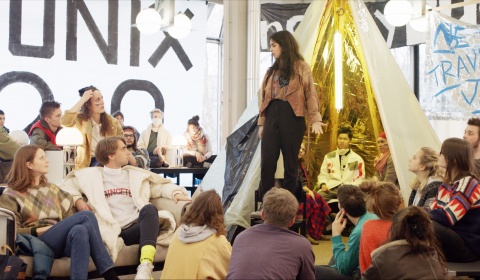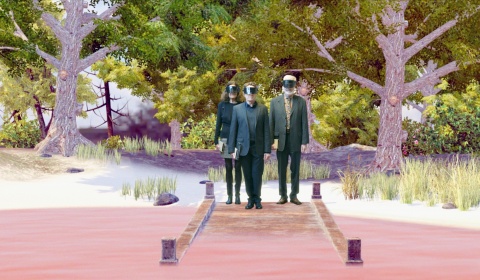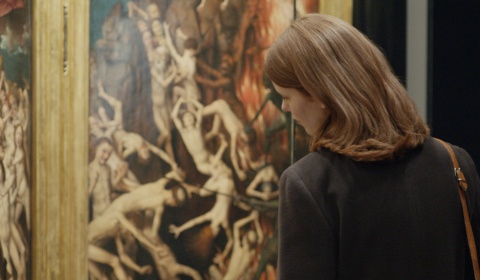
Music and Apocalypse
GER 2019, 80 min
Max Linz’s satire on the university business, stuck into third-party funding and evaluation.
Synopsis
The Institute for Cybernetics and Simulation Research is threatened with closure – the starting point for this satire about how the university system is to be transformed into a turbo-capitalist research machine. Phoebe Phaidon, a highly qualified, up-and-coming young academic, accepts yet another temporary teaching contract. With her progressive ideals on climate research still more or less intact, she acts as a link to the frustrated, yet combat-ready students who have occupied the library. On the other side of the battle lines are the established faculty, whose will to survive in the cesspool of third-party funding acquisition has ground them down into vain cynics for whom no ridiculous concession to evaluation madness is too grotesque. Max Linz crafts his film with a keen sense of Berlin’s sensitivities, urban backdrops, office décor and academic attire. And he exaggerates decadent university jargon with gusto, its buzzwords functioning almost like the bait in behavioural studies. By the end, the film has practically become a musical, with a catchy tune that could be a post-capitalist revolutionary anthem: “Why can’t it be nice here, why are we not happy?”
Streaming-Info
Rent or buy the movie on our Vimeo channel.
Language: German, Subtitles: English, Spanish
Film kaufen
VOD
451-Vimeo
amazon
DVD
451-Alive Shop
amazon
Press reviews
Above all, the verbal exchange of blows is great fun to watch. The dialogues are intelligent, misleading the viewer from the start, since he or she is bombarded with technical terms and concepts, which soon prove to lack any substance whatsoever. (...) The film is highly subversive – and therefore very much needed. – Teresa Vena, cineuropa, 13.2.2019
Awards and Festivals
- Berlinale Forum – Premiered on Feb 12, 2019
- BAFICI Buenos Aires International Festival of Independent Cinema 2019
- Lichter Filmfest Frankfurt 2019
- New Horizons International Film Festival Wroclaw 2019
- Underdox Filmfestival für Dokument und Experiment München 2019
- Europäischer Kinotag 13.9.2019
- Mostra Internacional de Cinema Sao Paulo IFF 2019
- Panorama Coisas do Cinema Salvador da Bahia 2019
- Kolkata International Film Festival 2019
Additional Texts
Interview with the director Max Linz
Why did you choose the university as the setting for your film?
I set my films in institutions in which a public debate on social issues takes place. In these institutions, I find parallels to my own work – perhaps the most important being that my films, like these institutions, are for the most part publicly funded. In 2004, I began studying at university just as the Bologna Process was coming into dominance. In seemingly the same moment, an official competition was launched between universities; it was named the German Universities Excellence Initiative. Such a competi- tion, which puts funding for science – and a lot of academics’ professional existence at stake – in the long run crea- tes few winners and a lot of losers. That circumstance didn’t previously exist within the german university system.
Can you describe the process of creating your script for Music and Apocalypse?
I wrote the screenplay with Nicolas von Passavant, a literary scholar from Basel. Together we drew a story outline for the film to start with. Between our writing sessions, we were going over the education policies and philosophical stances that certain universities were proposing in their mission statements. We were also considering image films they were producing, and other forms of promotion. Regardless of these institutions’ academic reputation, there is often something unintentionally tragicomic about their self-presentation. The constant emphasis on ‘selling’ the institution is so obvious.
How did you cast the actors for your film?
Most of the castings were based on previous collaborations. In my past films, Sarah Ralfs has always managed through her performance to lighten the skepticism that sometimes arises in my writing. Philipp Hauss joined the project early on. In addition to his engagement in theater, he also works in academia. Casting Sophie Rois as the head of the institute was the hope of everyone involved from the beginning. She makes perfect sense for the part and for the film. Rois has an artistic sensibility that I can only describe as unerring. She is a legitimate authority.
Can you talk about your decision to pose digital, VR imagery – projective of climate change – beside art historical motifs of the descent, particularly by including religious painting in the film?
The VR scenes and the paintings are independent figures unto themselves in the film. They both exercise a certain power, a certain agency. They bring into question the social contract by proposing cautionary visions of the future. They instruct their viewer how to lead a ‘devout’ life – essentially how to not end up in hell. In thinking about climate change, and in thinking about capitaldriven competition, it is more important that society find ways – in part by narratives and images – to abolish hell, rather than fear it.
Could the Chilean project Cybersyn, Phoebes roommate’s research project, be such a narrative?
It definitely implies a great amount of optimism. Through the coup d’état and everything that was destroyed with it, hell reenters the image. But other perspectives into the present are imaginable.
Watch Movie
VOD
451-Vimeo
amazon
DVD
451-Alive Shop
amazon
Credits
Director
Max Linz
With
Sarah Ralfs, Sophie Rois, Philipp Hauß, Bernd Moss, Maryam Zaree, Bastian Trost, Leonie Jenning, Luis Krawen, Martha von Mechow, Max Wagner, Anna Papenburg, Olga Lystsova, Kerstin Grassmann, Jean Chaize, Friedrich Liechstenstein
Screenplay
Max Linz, Nicolas von Passavant
Director of Photography
Carlos Andrés López
Editor
Bernd Euscher, René Frölke
Music
Gajek (mit Liedern von Franz Friedrich, Valeria Gordeev)
Sound
Andreas Mücke-Niesytka
Sound Design
Jochen Jezussek
Scenography
Sylvester Koziolek
Costume Design
Pola Kardum
Make-up Artist
Julia Böhm, Ferdinand Föcking
Producer
Maximilian Haslberger
Produced by
Amerikafilm
In Coproduction with
Rundfunk Berlin-Brandenburg (rbb)
Founded by
Kuratorium Junger Deutscher Film, Medienboard Berlin-Brandenburg, BKM
Created as part of the Initiative Leuchtstoff by rbb and Medienboard Berlin-Brandenburg
German Premiere
12.02.2019, Berlin, IFF - Forum
German Theatrical Release
24.10.2019
DVD-Details
Extras
Weitermachen Sanssouci - Cinéclub with Max Linz, Sophie Rois, Thomas Arslan, Carl Hegemann and Irene von Alberti, Trailer (All extras in German)
Language
German
Subtitles
English, Spanish
Country Code
Code-free
System
PAL / Color
Length
80 min + 80 min Extras
Aspect Ratio
16:9
Sound Format
DD 2.0 + 5.1
Set Content
Softbox (Set Content: 1)
Release Date
26.06.2020
Rating
Without age restriction
Distribution Details
Screening Format
DCP (2K, 24 fps, 5.1)
Blu-ray Disc
Aspect Ratio
16:9
Language
German
Subtitles
English
Promotion Material
Trailer, A1 poster, A3 poster
License Area
Germany, Austria, Swiss
Rating
Without age restriction






